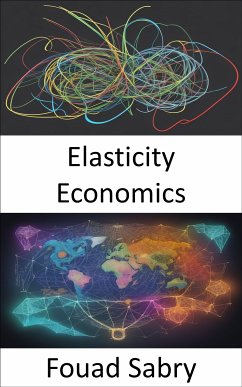What is Elasticity Economics
Elasticity is a concept that is used in economics to quantify how sensitive one economic variable is to a change in another economic variable. In the event if the price elasticity of demand for a certain item is -2, then a 10% rise in price results in a 20% decrease in the quantity of the item that is requested. In the field of economics, elasticity is a concept that helps readers comprehend how the behavior of buyers and sellers shifts in response to changes in price. In terms of demand and supply, there are two distinct forms of elasticity: the first type is known as inelastic demand and supply, while the second type is known as elastic demand and supply.
How you will benefit
(I) Insights, and validations about the following topics:
Chapter 1: Elasticity (economics)
Chapter 2: Monopoly
Chapter 3: Supply and demand
Chapter 4: Deadweight loss
Chapter 5: Profit maximization
Chapter 6: Price elasticity of demand
Chapter 7: Cross elasticity of demand
Chapter 8: Substitute good
Chapter 9: Price elasticity of supply
Chapter 10: Law of demand
Chapter 11: Demand curve
Chapter 12: Marginal revenue
Chapter 13: Total revenue test
Chapter 14: Tax incidence
Chapter 15: Demand
Chapter 16: Supply (economics)
Chapter 17: Derived demand
Chapter 18: Elasticity of a function
Chapter 19: Income elasticity of demand
Chapter 20: Total revenue
Chapter 21: Monopoly price
(II) Answering the public top questions about elasticity economics.
(III) Real world examples for the usage of elasticity economics in many fields.
Who this book is for
Professionals, undergraduate and graduate students, enthusiasts, hobbyists, and those who want to go beyond basic knowledge or information for any kind of Elasticity Economics.
Elasticity is a concept that is used in economics to quantify how sensitive one economic variable is to a change in another economic variable. In the event if the price elasticity of demand for a certain item is -2, then a 10% rise in price results in a 20% decrease in the quantity of the item that is requested. In the field of economics, elasticity is a concept that helps readers comprehend how the behavior of buyers and sellers shifts in response to changes in price. In terms of demand and supply, there are two distinct forms of elasticity: the first type is known as inelastic demand and supply, while the second type is known as elastic demand and supply.
How you will benefit
(I) Insights, and validations about the following topics:
Chapter 1: Elasticity (economics)
Chapter 2: Monopoly
Chapter 3: Supply and demand
Chapter 4: Deadweight loss
Chapter 5: Profit maximization
Chapter 6: Price elasticity of demand
Chapter 7: Cross elasticity of demand
Chapter 8: Substitute good
Chapter 9: Price elasticity of supply
Chapter 10: Law of demand
Chapter 11: Demand curve
Chapter 12: Marginal revenue
Chapter 13: Total revenue test
Chapter 14: Tax incidence
Chapter 15: Demand
Chapter 16: Supply (economics)
Chapter 17: Derived demand
Chapter 18: Elasticity of a function
Chapter 19: Income elasticity of demand
Chapter 20: Total revenue
Chapter 21: Monopoly price
(II) Answering the public top questions about elasticity economics.
(III) Real world examples for the usage of elasticity economics in many fields.
Who this book is for
Professionals, undergraduate and graduate students, enthusiasts, hobbyists, and those who want to go beyond basic knowledge or information for any kind of Elasticity Economics.
Dieser Download kann aus rechtlichen Gründen nur mit Rechnungsadresse in A, B, BG, CY, CZ, D, DK, EW, E, FIN, F, GR, H, IRL, I, LT, L, LR, M, NL, PL, P, R, S, SLO, SK ausgeliefert werden.









